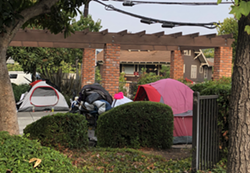[{
"name": "Ad - Medium Rectangle CC01 - 300x250",
"id": "AdMediumRectangleCC01300x250",
"class": "inlineCenter",
"insertPoint": "8",
"component": "2963441",
"requiredCountToDisplay": "12"
},{
"name": "Ad - Medium Rectangle LC01 - 300x250",
"id": "AdMediumRectangleCC01300x250",
"class": "inlineCenter",
"insertPoint": "18",
"component": "2963441",
"requiredCountToDisplay": "22"
},{
"name": "Ad - Medium Rectangle LC09 - 300x250",
"id": "AdMediumRectangleLC09300x250",
"class": "inlineCenter",
"insertPoint": "28",
"component": "3252660",
"requiredCountToDisplay": "32"
}]
At an April 13 special meeting, the San Luis Obispo City Council amended its municipal code to explicitly ban the use of tents in public parks and passed a new ordinance regulating shopping carts—both moves that aim to curb the impacts of homelessness, but that opponents say target and punish the unhoused during a pandemic.
The City Council voted 4-1 to pass the prohibition on tents at parks. In January, city officials began interpreting existing laws on "encroachment" to include tents—which had proliferated in parks, especially Mitchell Park—issuing three citations thus far. The April 13 amendment codified that interpretation into law, officials told the council.
"This isn't really new material," City Attorney Christine Dietrick said. "This really is a transparency measure."
Council members, city staff, and police all cited an influx of recent complaints from local residents who said they don't feel safe in the park with their children due to the presence of tents. Parks officials say the tents disrupt park maintenance, degrade the property, and pose a safety concern due to activities being obscured from view.
"Having spent time at a lot of the parks, but in particular, as does come up, Mitchell Park, it is and has been really at times truly scary," Mayor Heidi Harmon said, before voting for the amendment. "I recognize that not everyone who's unsheltered is a certain type of person. And, I think we all have to acknowledge that there are folks that are concerning for families with young kids there. I do feel a responsibility to make sure we're advocating for the next generation as well.
"We get ourselves into a really bad situation, including for the unsheltered folks," she continued, "by essentially allowing for an encampment to be established in a place like a public park that's intended to be inclusive for all members of the community."
Homeless advocates opposed the tent ban—calling it discriminatory, punitive, and poorly timed during a public health crisis and recession. Some claimed that the city and county lacked sufficient social services and shelter options for the unhoused, and said that the ordinance violated Martin v. City of Boise, a court ruling that requires cities enforcing camping ordinances to have adequate shelter alternatives.
Michelle Mansker, a volunteer with SLO Street Medics, called in from Mitchell Park, where she and some unhoused individuals were listening to the meeting. Mansker reminded the council that two community members recently died while living in Mitchell Park.
"I think that we as a city need to meet these folks where they are and actually listen to their needs," Mansker said. "Many folks report that they're not being heard. SLO County and SLO city lack diversity in services. There needs to be other options. ... There needs to be more help ... more compassion ... more empathy."
Frank Kopcinski, an attorney with the California Rural Legal Assistance, said he's representing several local unhoused individuals. He called the amendment unconstitutional.
"In attempting to hide the humanity, clean it up, and sweep it away, you hide the constitutional violations against humans who are just trying to sleep," Kopcinski said. "The proposed enactment of this amendment as it's written is discriminatory and unconstitutional."
City leaders countered that the 40 Prado Homeless Services Center located in town has beds available and emphasized that a new countywide investment in homeless solutions is forthcoming. Councilmember Andy Pease dissented in the vote, siding with advocates who questioned the timing and circumstances around the ban.
Along with the tent amendment, the City Council unanimously passed the first reading of a new ordinance to regulate abandoned shopping carts. The policy requires grocery stores to make efforts to secure their shopping carts every night, label them with their store information, and promptly retrieve them when they are found abandoned off-site.
The council asked city staff to remove some language that appeared to connect the definition of an "abandoned shopping cart" to someone who's actively using a shopping cart to store their belongings.
Officials said the main purpose of the ordinance is reduce the number of shopping carts littered throughout the city.
"We haven't done a full inventory," City Manager Derek Johnson said, "but ... there have been times where I've literally seen hundreds and hundreds of carts. We'll call the merchant and say, 'Hey will you please come pick up your carts?' A lot of them will say, 'This is the cost of doing business. ... The cost of picking up the carts, cleaning the carts, and putting them back into service, I'd rather order a new one.'"
Both of the ordinances passed on April 13 will require a second reading before they are fully codified and can be enforced. Δ
Latest in News
Comments
Showing 1-1 of 1
Readers also liked…
-

Coast Unified teachers upset over new position's salary and qualifications
Oct 20, 2022 -

SLO police identify alleged driver who hit and killed couple
Dec 22, 2022 -

When the levee breaks: Oceano residents, county officials walk a tightrope of regulations to manage Arroyo Grande Creek, which some say led to the levee's failure in January
May 18, 2023










